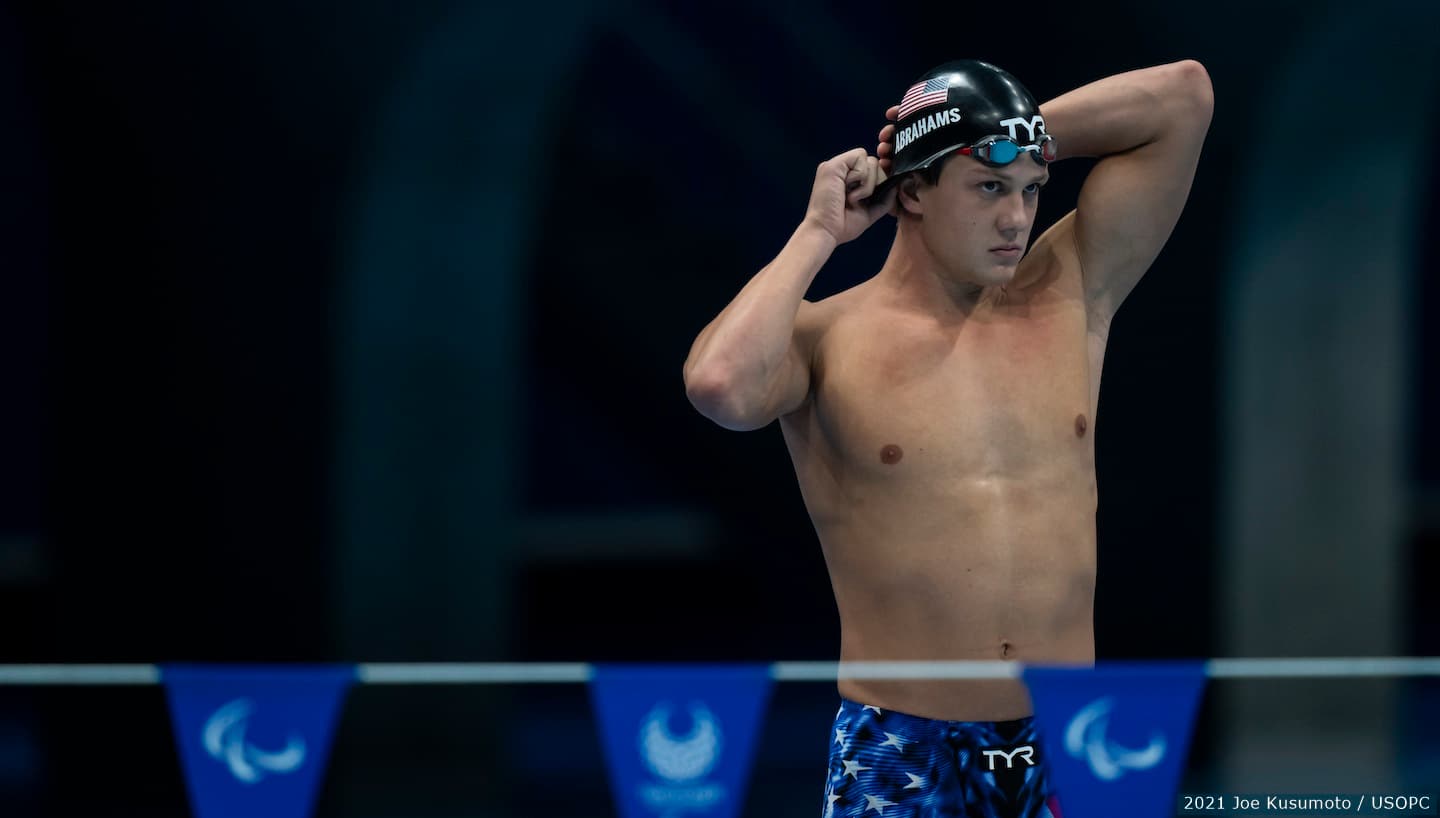
Once David Abrahams Went For It As A Para Swimmer, Success Quickly Followed
by Karen Price

David Abrahams adjusts his swim cap before a race at the Paralympic Games Tokyo 2020. (Photo: Joe Kusumoto)
If you’re a sighted swimmer, it’s pretty easy to find out how you did in a race.
Just turn around and look up at the scoreboard.
It’s not so simple for a visually impaired swimmer, however, which is part of the reason why David Abrahams didn’t know he’d won a silver medal in the 100-meter breaststroke SB13 at the Paralympic Games in Tokyo until well after he was out of the pool.
“Obviously I can’t see the scoreboard, and people were saying if you get a podium there’s going to be lights on the side of the block,” said Abrahams, 20. “I was looking for them and didn’t see them so I was like, ‘Oh, I guess I didn’t medal.’ I don’t think I even knew during the interview with NBC. I had to ask the guy escorting me, ‘How did I do?’”
Abrahams is still new to the world of Para swimming, having made his debut just this past April at a meet in Lewisville, Texas, where he set the Americas record in the 100-meter breaststroke. Although it seems like a rapid rise from there to making his first Paralympic team in June to medaling in Tokyo in September — and it is — Abrahams is no stranger to the sport.
The Havertown, Pennsylvania, native started swimming when he was 6, then fully sighted, joining his three older brothers in the pool.
“Obviously a guy growing up with all boys wants to be better than all his brothers,” Abrahams said. “That was always the goal.”
Two years later, after he won his first local meet, he told his parents he wanted to drop all his other sports to focus on swimming. By the time he was entering his senior year of high school he was getting looks from Division I colleges.
He was also several years into losing his vision.
Abrahams has Stargardt disease, a genetic disease that causes loss of central vision and usually starts in childhood or adolescence. He remembers noticing the first symptoms when he was in the sixth grade.
Because Abrahams was always a swimmer, and because the vision loss is progressive, he was able to adjust in the pool as his sight grew worse. Meanwhile, his times got better, he got stronger and after a visit to Harvard University he knew that was where he wanted to be.
Abrahams is a rarity as a legally blind Division I college swimmer — he isn’t personally aware of any others, although he says there certainly could be — but perhaps even more unusual is the fact that he didn’t become involved in Para swimming until his sophomore year at Harvard.
Part of the reason, he said, is that he wasn’t aware there was a Paralympic classification for swimmers who were legally blind but not completely blind until his senior year of high school. Abrahams said his vision loss is like there’s a weird, misshapen blob in his center of his eye that blocks anything that comes into its field, but he does have peripheral vision.
There was also another reason he waited to pursue Para swimming.
“I struggled a bit with my identity as a blind person in general, so I didn’t know that I wanted to put myself out there,” he said.
As that changed after high school graduation, he decided to give Para swimming a try. Making the Paralympic team right off the bat was a bit mind-boggling, he admitted.
“It took a really long time to set in,” he said. “Even after I went to Tokyo. It wasn’t until I saw the competition pool and realized I was going to be swimming against the best in the world on national TV that it was like, oh my goodness. It was an unbelievable feeling.”
Abrahams competed in the 100-meter butterfly, the 200-meter individual medley and the breaststroke, his signature event, in Tokyo. The breaststroke wasn’t until the last day of competition, the day before he was to fly home, and Abrahams said one thing he wasn’t prepared for was how emotionally taxing a 10-day meet of that magnitude was going to be.
“Definitely having that experience now would have helped me then, just knowing to take it easy, don’t stress over the small things and relax where you can,” he said.
Back at Harvard, his first class of junior year actually started the same day he won his silver medal. He flew home, attended his brother’s wedding then went back to campus. There’s a video of his coaches and teammates all gathered around the TV in the training room going crazy watching his race in the middle of the night, so he knew he was coming home to a nice welcome from them.
His teammates weren’t the only ones who were proud of his accomplishment.
“It’s a testament to how much the Para movement has grown because people were stopping me and saying congratulations and all that stuff,” he said. “There was definitely a bigger response from the Harvard community than I was expecting.”
Abrahams is a math major, and although he isn’t positive what he wants to do with that just yet, he is certain he made the right call getting involved in Para swimming.
“Oh, absolutely,” he said. “Journey of a lifetime, and I’m thrilled that I came to that decision and that everyone’s been so supportive.”
Karen Price #
Karen Price is a reporter from Pittsburgh who has covered Olympic and Paralympic sports for various publications. She is a freelance contributor to USParaSwimming.org on behalf of Red Line Editorial, Inc.